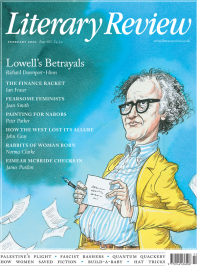Howard Davies
Off the Money
The Economists’ Hour: How the False Prophets of Free Markets Fractured Our Society
By Binyamin Appelbaum
Picador 438pp £20
The great financial crisis of 2007–9 was no end of a lesson for the economics profession. Prior to it, hardly any economist drew attention to the global imbalances that had built up in the early 2000s and are now seen as a crucial element in the meltdown. Nor, with a few notable exceptions, did economists spot that the vertiginous growth in financial transactions and in leverage would leave markets highly vulnerable to a downturn triggered by a drop in US house prices.
Economists were not alone in their failure, of course. There has been much heart-searching among bankers and regulators, and even occasionally among the politicians who were cheerleaders for the boom. But for the dismal science it was certainly a wake-up call. The so-called ‘Queen’s Question’ has reverberated around senior common rooms on both sides of the Atlantic. While opening a new building at the LSE, Her Majesty was treated to a short presentation on the crash by Professor Luis Garicano. After listening politely she asked, ‘Why did no one see it coming?’ The British Academy convened a working group in an attempt to provide an answer and wrote at length to the palace. Garicano subsequently defrocked himself and is now leader of the Spanish liberal group in the European Parliament, where he seeks redemption. The rest of the economics profession continues to debate what went wrong.
George Soros has provided generous funding for several Institutes for New Economic Thinking around the world. These are having a major impact on curriculum design and research priorities. Central banks, meanwhile, are struggling to integrate financial markets into their economic models and to find metrics of financial instability that will

Sign Up to our newsletter
Receive free articles, highlights from the archive, news, details of prizes, and much more.@Lit_Review
Follow Literary Review on Twitter
Twitter Feed
The latest volume of T S Eliot’s letters, covering 1942–44, reveals a constant stream of correspondence. By contrast, his poetic output was negligible.
Robert Crawford ponders if Eliot the poet was beginning to be left behind.
Robert Crawford - Advice to Poets
Robert Crawford: Advice to Poets - The Letters of T S Eliot, Volume 10: 1942–1944 by Valerie Eliot & John Haffenden (edd)
literaryreview.co.uk
What a treat to see CLODIA @Lit_Review this holiday!
"[Boin] has succeeded in embedding Clodia in a much less hostile environment than the one in which she found herself in Ciceronian Rome. She emerges as intelligent, lively, decisive and strong-willed.”
Daisy Dunn - O, Lesbia!
Daisy Dunn: O, Lesbia! - Clodia of Rome: Champion of the Republic by Douglas Boin
literaryreview.co.uk
‘A fascinating mixture of travelogue, micro-history and personal reflection.’
Read the review of @Civil_War_Spain’s Travels Through the Spanish Civil War in @Lit_Review👇
John Foot - Grave Matters
John Foot: Grave Matters - Travels Through the Spanish Civil War by Nick Lloyd; El Generalísimo: Franco – Power...
literaryreview.co.uk